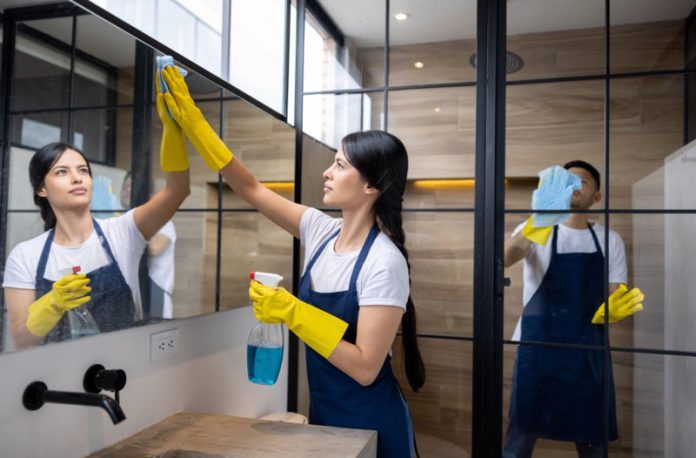Introduction
A truly clean home is more than just surface-level tidiness; it’s a deep commitment to the unseen, ensuring every nook is free of dirt and every cranny is clear of germs. This deep cleaning is a crucial step—not just for maintaining a space that looks good, but for fostering an environment that feels good, too. It’s about safeguarding the health of everyone under your roof by targeting those out-of-sight areas where dust and bacteria like to hide. Whether you tackle it yourself or bring in professionals, the goal is the same: a home that’s not just clean, but wholesomely hygienic.
The Difference Between Regular Cleaning and Deep Cleaning
Understanding the distinction between regular cleaning and deep cleaning is crucial for maintaining a truly hygienic home. Regular cleaning is what most of us do frequently—it’s the sweeping, the dusting, and the wiping that we incorporate into our daily routines to keep our living spaces orderly and neat. Think of it as the daily upkeep that wards off chaos and clutter.
Deep cleaning, on the other hand, is the all-encompassing scrub down that you might not do as often but is vital for reaching the areas that regular cleaning doesn’t touch. It’s about tackling the buildup behind appliances, under the furniture, and inside the oven—places that don’t get attention in the daily sweep but can harbor dust, grime, and all sorts of unwelcome guests.
While regular cleaning can be likened to daily brushing, deep cleaning is akin to full dental cleaning—it’s more thorough and essential for long-term hygiene. It’s a process that can be quite an undertaking, which is why it’s often scheduled less frequently. However, the experts at Endeavor Clean point out that this deep dive into cleaning is indispensable for not just the cleanliness but also the health of your home. It’s these meticulous efforts that keep your living space in top-notch condition, ensuring that every corner, whether seen or unseen, contributes to a clean and healthy environment.
Health Implications of Poor Home Hygiene
The cleanliness of our homes is inextricably linked to our health. It’s not just about making a good impression on guests or keeping up with the chores; it’s a matter of well-being. Poor home hygiene can become a silent threat, with the potential to cause a variety of health issues that we may not immediately attribute to our living environment.
Dust mites, pet dander, mold, and mildew are just a few of the culprits that thrive in less-than-clean conditions. These allergens can trigger reactions ranging from mild sneezing and coughing to severe asthma attacks and allergic responses. Moreover, neglected surfaces can become breeding grounds for bacteria and viruses, some of which can lead to more serious illnesses.
The risks are even higher for the most vulnerable among us: infants, the elderly, and those with compromised immune systems. For them, a clean home can be a line of defense against potential health complications. It’s not just about the occasional sniffle; it’s about protecting those we love by maintaining an environment that supports their health.
The Role of Deep Cleaning in Disease Prevention
Deep cleaning plays a pivotal role in the prevention of diseases within our homes. It’s a thorough process that involves disinfecting surfaces to kill pathogens that can cause illness. This is particularly important in areas where germs are more likely to spread, such as kitchens and bathrooms, or any high-touch surfaces like doorknobs, light switches, and remote controls.
The effectiveness of deep cleaning in disease prevention is backed by science. For instance, The Centers for Disease Control and Prevention said that disinfecting surfaces can lead to a significant reduction in the spread of contagious diseases, including seasonal flu and other common infections. By eliminating the bacteria and viruses that can linger on surfaces for hours or even days, deep cleaning acts as a barrier to the spread of infectious diseases.
Moreover, deep cleaning isn’t just about what products are used; it’s also about technique and consistency. It involves a strategic approach to cleaning, ensuring that every part of the home is addressed and that the cleaning itself is done regularly enough to maintain a hygienic environment. This includes less obvious tasks like washing curtains, cleaning vents, and even purifying the air.
Incorporating deep cleaning into your regular home maintenance schedule can make a substantial difference in your overall health. It’s a step that goes beyond the basics, providing peace of mind that your home is not just clean, but also a haven from the germs that we inevitably bring in from the outside world.
Psychological Benefits of a Deep-Cleaned Home
The advantages of a deep-cleaned home extend beyond the physical to the psychological, influencing our mental health and emotional well-being. A clean and organized environment can lead to a clear and focused mind. The act of cleaning itself has been reported to have therapeutic effects, providing a sense of accomplishment and control over one’s environment.
Clutter and mess can be overwhelming and contribute to daily stress. Studies suggest that people living in cluttered spaces are more likely to experience higher levels of cortisol, the stress hormone. On the flip side, a clean space can promote relaxation and comfort. After a deep cleaning session, the sense of renewal in your home can mirror a renewed state of mind, often leading to improved mood and reduced anxiety.
Moreover, the order and cleanliness achieved through deep cleaning can enhance productivity. With everything in its place, you’re less likely to be distracted by disarray and more inclined to engage in productive activities. For those working from home, this is especially pertinent, as a clean work environment can contribute to a more professional mindset and efficient work habits.
The psychological impact of a clean home is also tied to sleep quality. A bedroom free of clutter and dust is more conducive to a good night’s rest. The comfort of clean sheets and the freshness of a well-ventilated room can help in winding down and achieving the kind of restorative sleep that is essential for mental health.
How Often Should You Deep Clean?
Creating a deep cleaning schedule is crucial for keeping your home hygienic and comfortable. The frequency of deep cleaning varies based on your living situation, including the size of your home, how many people live there, and whether there are pets or residents with allergies. Generally, it’s advisable to perform a thorough deep clean at least twice annually to address the dirt and debris that accumulate over time. High-use areas like kitchens and bathrooms may require more frequent attention, with experts suggesting a deep clean every three months to prevent mold and bacterial growth due to moisture and food spills.
In addition to these scheduled cleans, it’s important to regularly sanitize high-traffic and frequently touched surfaces to maintain a basic level of cleanliness and hinder the spread of germs. This means monthly cleanings of door handles, light switches, and remote controls, along with a comprehensive cleaning of floors. Homes with pets, children, or allergy sufferers might need to deep clean more often, particularly for fabrics like carpets and upholstery, which could require attention every three to four months. Flexibility is also key; unexpected events like illness or new pets may call for an impromptu deep clean. Ultimately, deep cleaning is an investment in the health of your home and the well-being of your family, ensuring a consistently welcoming and clean space throughout the year.
Conclusion
In summary, regular deep cleaning is an essential practice for a healthy home, acting as a defense against hidden germs and contributing to a sense of well-being. It’s about more than just cleanliness; it’s about creating a space where health and happiness can flourish. Whether you’re scrubbing the floors yourself or hiring a helping hand, the investment of time and effort in deep cleaning pays dividends in the form of a safe, serene, and harmonious living environment for you and your family.












